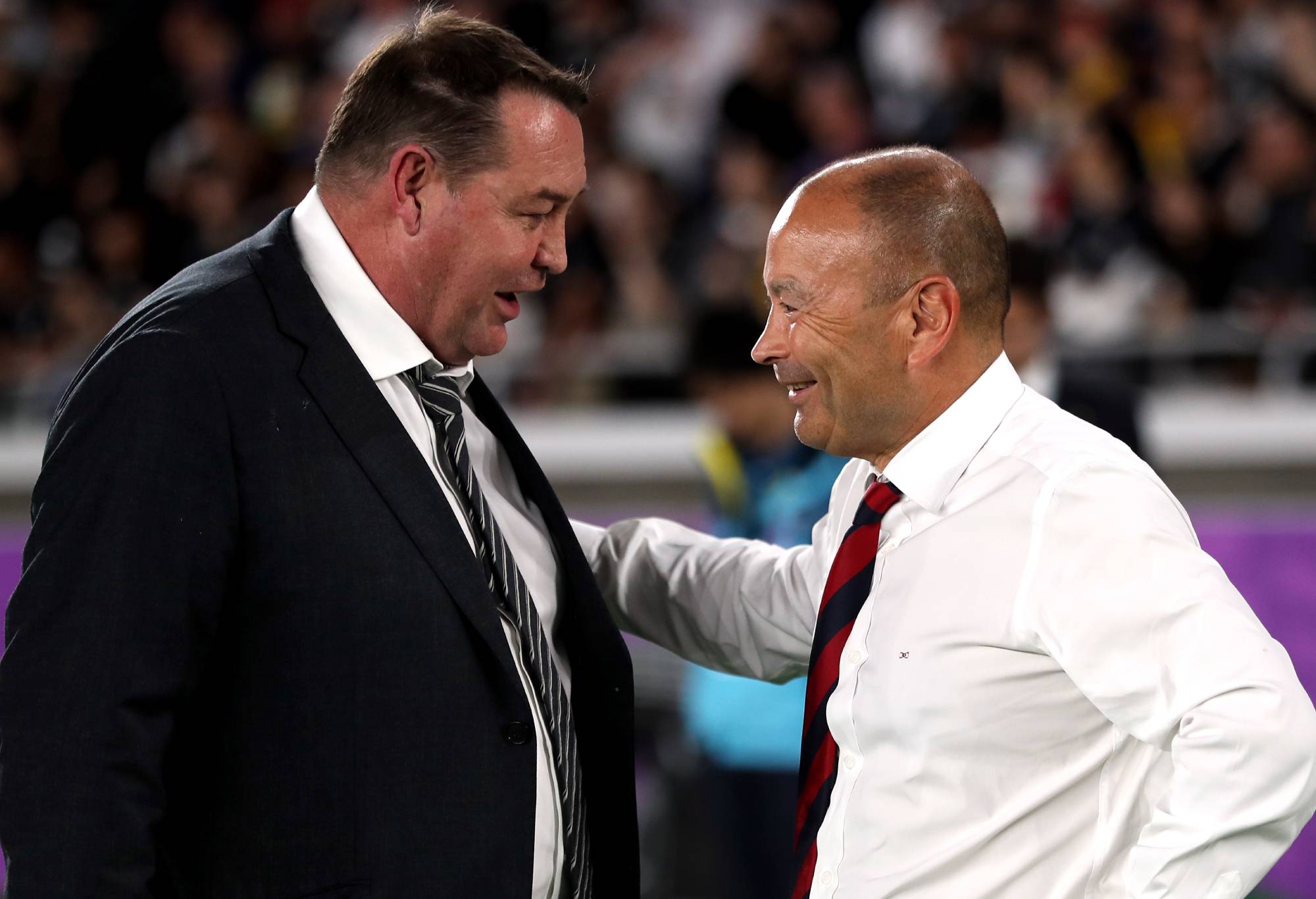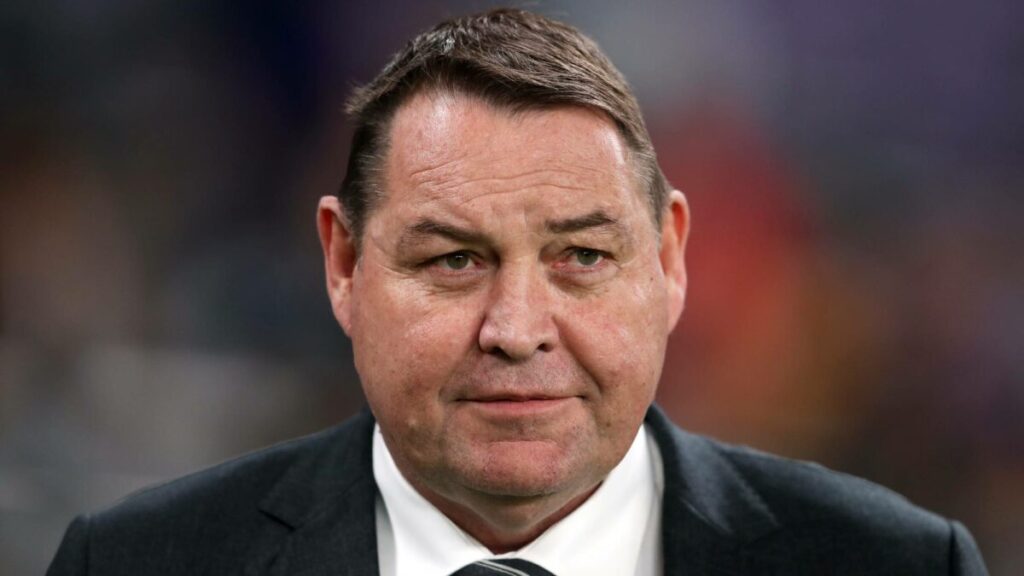As the Wallabies ready to try and end a two-decade Bledisloe Cup drought, World Cup-winning All Blacks coach Steve Hansen says he was “surprised” by what he saw from the men in gold during a brief stint ahead of last year’s tournament in France.
In an exclusive interview with The Roar Rugby podcast, Hansen gave a unique insight into the failures of last year’s World Cup campaign by saying the national group wasn’t operating like a high-performance set up should.
“If you went through and wrote down everything that you would expect a high-performance Test athlete to have, then I would suggest that maybe some of those things are missing,” said Hansen, who shocked many by accepting an invitation from Eddie Jones to join the Wallabies in Paris last August ahead of the World Cup.
Despite his brief stint with the Wallabies, the respected coach said he didn’t plan on following in the footsteps of Robbie Deans, Dave Rennie and Joe Schmidt of trying to become the head coach.
“I’d never coach Australia because my job’s been done in that area,” he said.
“But I enjoyed my time in there because they’re a good group of men, who were trying to do the best they could for themselves and their country. One rugby team is not that much different to another one.”
Steve Hansen spent a week with the Wallabies leading up to last year’s World Cup and was surprised the lack of a high performance environment. (Photo by David Davies/PA Images via Getty Images)
He did however offer some unique insights into what he witnessed in Paris.
“There were things that I saw that surprised me, and I’m not going to go into those things, but if you haven’t got your high performance right then players aren’t going to arrive at the Test arena with all the things they need ticked and understood,” Hansen said.
“That makes it hard because you’ve got to learn it at the very highest level. And for me, that’s what rugby’s about at the lower levels. You’re preparing people to be better at a higher level.
“Along the way, you can win tournaments and competitions, and that’s great. But what you’re really trying to do is get everybody in your group better.
WATCH THE ROAR PODCAST WITH STEVE HANSEN IN THE PLAYER BELOW
“If they’re good enough, then they go to the next level. But they go there with the fundamentals really well taught, the mental skills to be able to cope with it, and leadership and all that sort of stuff.
“We talk about leadership a lot, but leadership is really about leading yourself. How you get through the dark moments, how you get through the moments when things don’t go right, how you get through the things when they’re going really good, and you keep your feet grounded. And it’s about preparing yourself well.
“If you don’t have all of those understandings to the highest level, then you get found out at Test level. I think that’s where Australian rugby really needs to work hard at helping their players, fast-track them to a higher level by educating them, and making it more competitive.”
Win a Ziggy BBQ for Grand Final day, thanks to Barbeques Galore! Enter Here.

Eddie Jones invited Steve Hansen into Wallabies camp last year in Paris ahead of the World Cup. (Photo by David Davies/PA Images via Getty Images)
Hansen, who was an assistant under Graham Henry when the All Blacks ended their World Cup drought in 2011 and oversaw their success in 2015, said he felt players in Australia didn’t have to fight hard enough to become a professional.
“I think good rugby players come out of good high-performance environments,” Hansen said.
“If you allow too many people into those environments without having to work too hard, then you get a soft underbelly.
“When I think of Australia, when they were really, really strong and winning World Cups and so forth, they really only had three Super teams.
“I understand the need to grow the game across the country…
“To get in there, you’re going to have to be really working hard. You’re wanting to be better all the time and there’s a competition to get in. At the moment, I think it’s too easy to get a Super contract.
“It’s easy for me to talk about this because I’m sitting back, not having to make any of the decisions. It’s not an easy solution because you’ve still got to develop rugby on the west coast and down south in Melbourne and those places.
“We need rugby being played in all of Australia, just like we need it being played in all of New Zealand. How do we do that but yet still be able to manufacture competition for professional players and a pathway for them to go into? It costs money and it’s not something Australia rugby have a lot of, so there’s another difficulty.”
The fact Schmidt has given debut caps to 16 players across the opening seven Tests in 2024 – an all-time high in the professional era – and leaned on four different captains speaks to the instability currently in Australian rugby.
But Hansen added it wasn’t “necessarily a bad thing” that Schmidt had cast the net wide to build leadership.
“When you’re captain, you actually work out the nuts and bolts of what leadership’s about and what’s required and what you can do to help the captain,” Hansen said.
“We only had two or three captains, but we had 12 leaders in the group all the time. Over a period of time, they changed.
“Their responsibility, first and foremost, is to be the best players on the park, but then it’s also their leaders because they can lead themselves first and they can take some responsibility and lead others in a positive manner. It’s not just the captain that has to do that.
“I can see what Joe’s trying to do. He’s trying to expose as many people as he possibly can to a) Test rugby, hence the new caps, but b) his leadership with the captains, he’s rotating around saying, right, I will get a taste of it. This is what we need from our leading players.
“Just because you’ve got C-A-P-T beside your name this week, if you don’t have it next week, you still need to be a leader and still need to help drive this team to a higher level. That takes time.
“He’s trying to speed that process up by giving them the opportunity to be up front and actually lead the group.”

Steve Hansen doesn’t think it’s a “bad thing” that Joe Schmidt has cast the captaincy net wide. (Photo by Niall Carson/PA Images via Getty Images)
Hansen agreed with recent commentary that South Africa’s departure from Super Rugby had hurt the development of players and good habits.
“I think there’s a lot of truth to it,” he said.
“We all know they play a different style of rugby to both New Zealand and Australia, and it’s a style that’s abrasive and it’s very, very physical.
“At the moment, they’re very inventive as well. Rassie’s [Erasmus] not shy of reinventing what they’re doing, and you want to be playing against teams like that, I think, every week or as much as possible, and Super Rugby allowed that to happen.
“It’s a difficult place to tour. If you haven’t been there before, it can be daunting as well and overwhelming. The more times you go there and play, I think, the better. Super Rugby is poorer for South Africa not being in it.”
As for his favourite Bledisloe Cup memory?
“It always felt good after we’d lost a game and then we’d come back home and we’d play the next one and we’d sort out the problem,” Hansen said.

Former All Black coach Steve Hansen drinks from the Bledisloe Cup following their win over the Wallabies on August 27, 2016 in Wellington. (Photo by Phil Walter/Getty Images)
“They were always good feelings. But I guess the best moment is drinking out of it.
“Australia will get their turn eventually as well. It’ll happen at some point, it’s a two-point race and sooner or later someone’s going to upset the apple cart and win it. And it’ll be such a wonderful thing for those people who are involved because they’ll get to drink out of it.”

